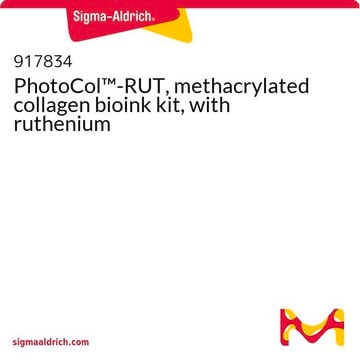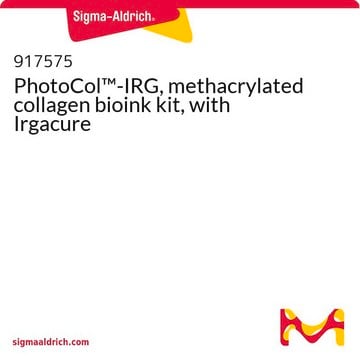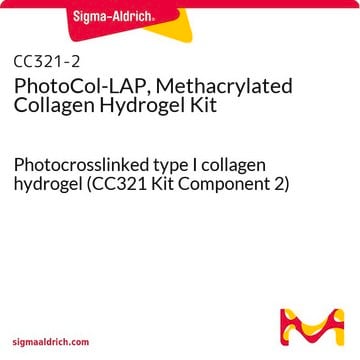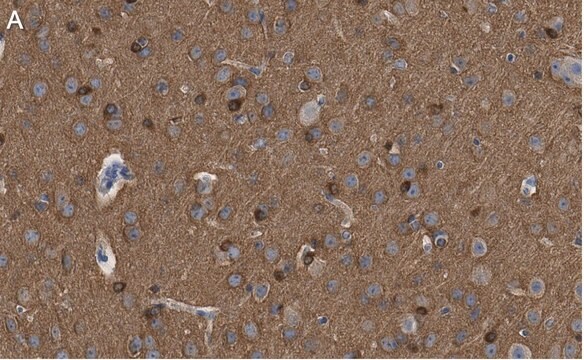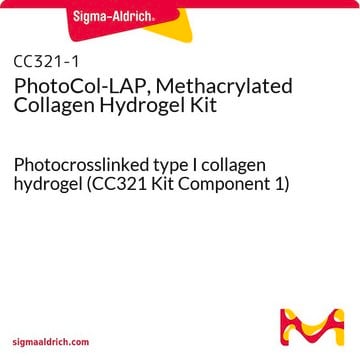916293
PhotoCol™-LAP
methacrylated collagen bioink kit, with LAP
Synonyma:
3D Bioprinting, Bioink, Collagen
Přihlásitk zobrazení cen stanovených pro organizaci a smluvních cen
About This Item
UNSPSC Code:
12352201
NACRES:
NA.23
Doporučené produkty
description
Methacrylated collagen:
Degree of methacrylation ≥ 20%
Product components :
Quality Level
sterility
sterile; sterile-filtered
form
liquid
impurities
≤10 EU/mL Endotoxin
storage temp.
2-8°C
Application
PhotoCol™-LAP bioink kit consists of purified methacrylated Type I bovine collagen as the core component with other support reagents. The methacrylated Type I collagen is produced from telo-peptide intact bovine collagen where the collagen has been modified by reacting the free amines, primarily the ε-amines groups of the lysine residues as well as the a-amines groups on the N-termini. Over 20% of the total lysine residues of the collagen molecule have been methacrylated. A bottle of 20 mM acetic acid solution is provided to solubilize the lyophilized methacrylated collagen at concentrations ranging from 3 to 8 mg/ml. The neutralization solution consists of an alkaline 10X phosphate buffered saline (PBS) solution which provides physiological salts and pH in the final mixture. The photoinitiator consists of LAP to be formulated in 1X cell culture media or PBS, which allows blue light photocrosslinking of the printed structure at 405 nm. PhotoCol™-LAP provides native-like 3D collagen gels, and the final gel stiffness can be customized by changing collagen concentrations and crosslinking.
Legal Information
PhotoCol is a trademark of Advanced BioMatrix, Inc.
Storage Class
10 - Combustible liquids
Vyberte jednu z posledních verzí:
Již tento produkt vlastníte?
Dokumenty související s produkty, které jste v minulosti zakoupili, byly za účelem usnadnění shromážděny ve vaší Knihovně dokumentů.
A New Approach to Design Artificial 3D Microniches with Combined Chemical, Topographical, and Rheological Cues.
Stoecklin, Celine, et al.
Advanced Biosystems, 1700237-1700237 (2018)
Kathryn E Drzewiecki et al.
Langmuir : the ACS journal of surfaces and colloids, 30(37), 11204-11211 (2014-09-11)
Type-I collagen self-assembles into a fibrillar gel at physiological temperature and pH to provide a cell-adhesive, supportive, structural network. As such, it is an attractive, popular scaffold for in vitro evaluations of cellular behavior and for tissue engineering applications. In
Andrea Mazzocchi et al.
ACS biomaterials science & engineering, 5(4), 1937-1943 (2019-11-15)
Lung cancer is the leading cause of cancer-related death worldwide yet in vitro disease models have been limited to traditional 2D culture utilizing cancer cell lines. In contrast, recently developed 3D models (organoids) have been adopted by researchers to improve
UV-Assisted 3D Bioprinting of Nanoreinforced Hybrid Cardiac Patch for Myocardial Tissue Engineering.
Mohammad Izadifar et al.
Tissue engineering. Part C, Methods, 24(2), 74-88 (2017-10-21)
Biofabrication of cell supportive cardiac patches that can be directly implanted on myocardial infarct is a potential solution for myocardial infarction repair. Ideally, cardiac patches should be able to mimic myocardium extracellular matrix for rapid integration with the host tissue
Ian D Gaudet et al.
Biointerphases, 7(1-4), 25-25 (2012-05-17)
Type-I collagen is an attractive scaffold material for tissue engineering due to its ability to self-assemble into a fibrillar hydrogel, its innate support of tissue cells through bioactive adhesion sites, and its biodegradability. However, a lack of control of material
Náš tým vědeckých pracovníků má zkušenosti ve všech oblastech výzkumu, včetně přírodních věd, materiálových věd, chemické syntézy, chromatografie, analytiky a mnoha dalších..
Obraťte se na technický servis.